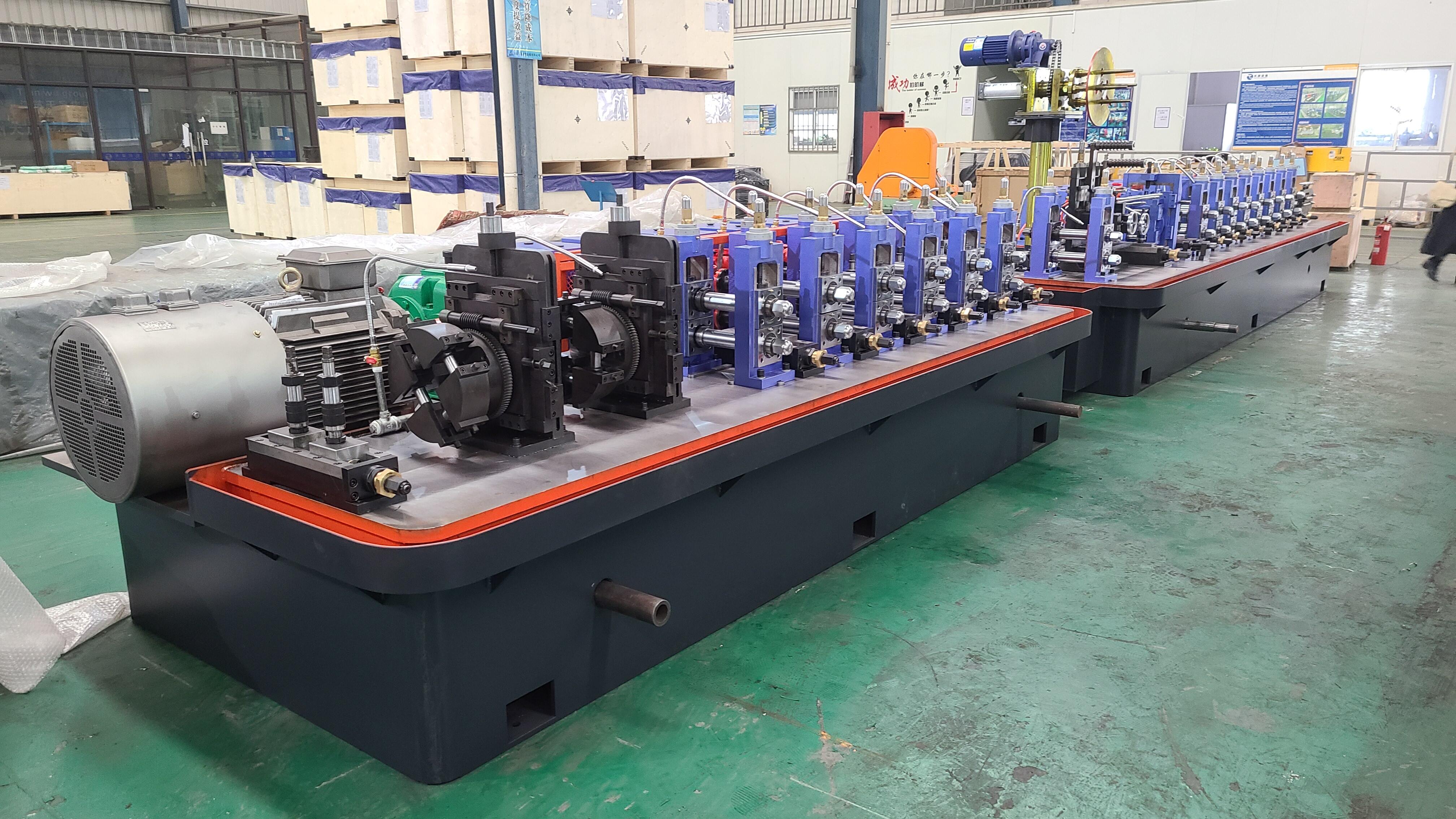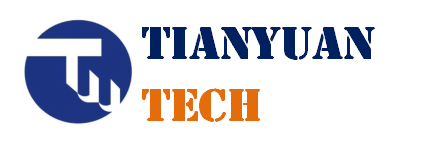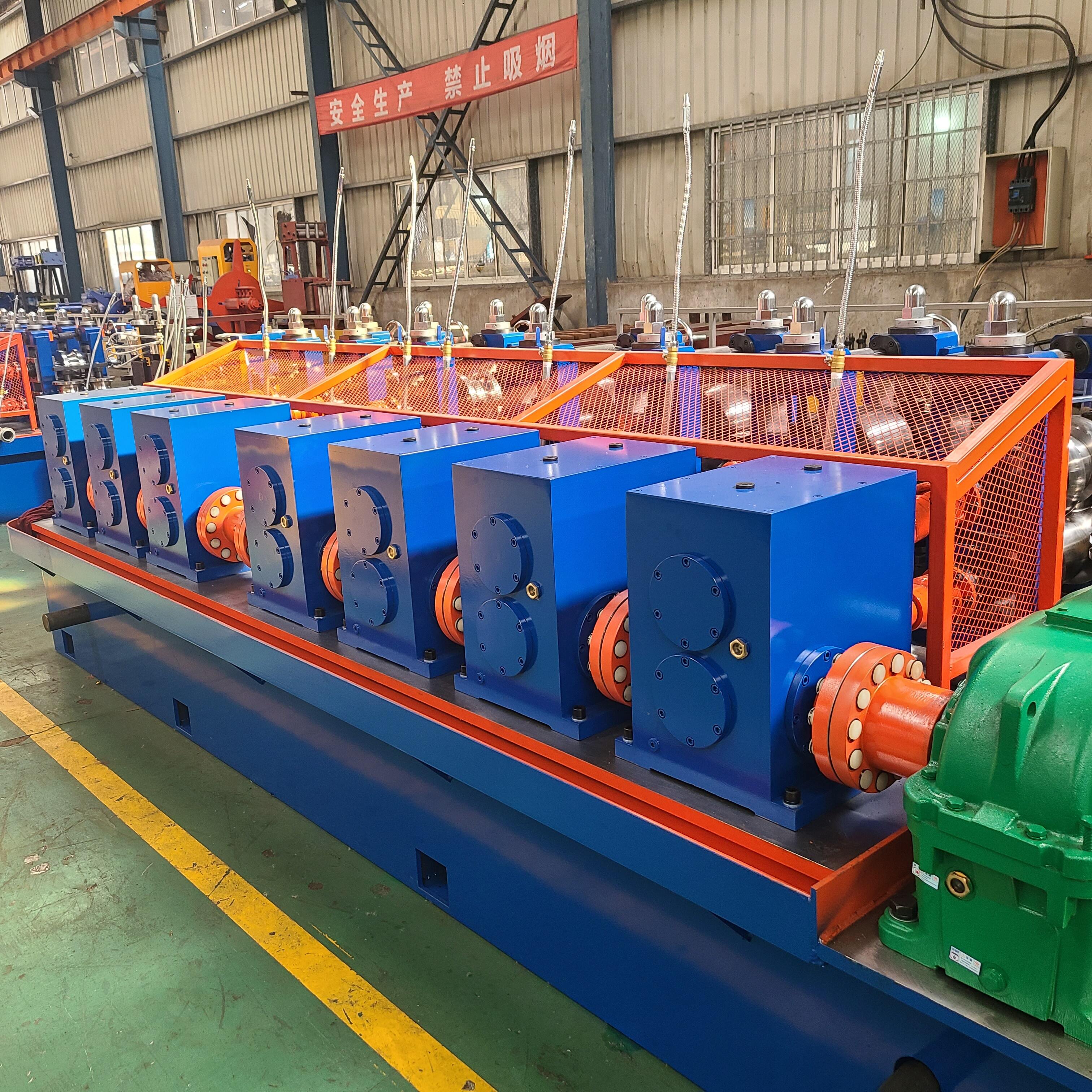Revolutionizácia výroby kovových rúr prostredníctvom pokročilých technológií
Výrobný priemysel zažil v posledných desaťročiach významné zmeny, pričom Stroje na výrobu ERW rúr sa stali prelomovou technológiou vo výrobe rúr. Tieto sofistikované stroje znovu definovali štandardy efektívnosti a kvality vo celom odvetví kovového spracovania. Použitím najmodernejších technológií a automatizovaných procesov sa stroje na výrobu ERW rúr stali nepostrádateľným aktívom pre výrobcov, ktorí si kladia za cieľ zvýšiť svoju prevádzkovú efektívnosť a konkurencieschopnosť na trhu.
Súčasné stroje na výrobu ERW rúr predstavujú dokonalé spojenie presného inžinierstva a možností automatickej výroby. Umožňujú nepretržitú výrobu vysokej kvality zváraných rúr pri zachovaní konštantnej rozmerej presnosti a vynikajúcej povrchovej úpravy. Tento technologický pokrok nielen optimalizoval výrobné procesy, ale tiež výrazne znížil odpad materiálu a náklady na prácu.
Základné komponenty a prevádzková excelencia
Nezávislé komponenty strojov
V srdci zváracích zariadení pre výrobu rúr ERW sa nachádza sofistikované usporiadanie komponentov, ktoré pracujú v dokonalom súlade. Systém odvíjania spúšťa proces hladkým privádzaním kovových pásov do tvárniaceho úseku. Jednotka prípravy okrajov pásovej ocele zabezpečuje presné zarovnanie a čistenie okrajov pred zváraním. Tvárniaci úsek, vybavený viacerými valcami, postupne tvaruje plochý pás do trubicového tvaru cez jednotlivé tvárniace fázy.
Stanica vysokofrekvenčného zvárania predstavuje najkritickejší komponent, kde sú okraje spojené pomocou elektromagnetickej indukcie alebo kontaktných zváracích metód. Po-zváracie stanice, vrátane chladiacich systémov a kalibrovacích jednotiek, zabezpečujú, že finálny produkt spĺňa presné špecifikácie. Systémy kontroly kvality integrované po celom výrobnom rade sledujú v reálnom čase parametre výroby.
Pokročilé riadiace systémy
Moderné stroje na výrobu zváraných trubiek ERW sú vybavené sofistikovanými riadiacimi systémami, ktoré optimalizujú každý aspekt výroby. Riadiace jednotky založené na PLC spravujú parametre stroja, zatiaľ čo pokročilé snímače sledujú kritické premenné, ako sú teplota, tlak a rozmerná presnosť. Tieto systémy umožňujú presné úpravy počas prevádzky a zabezpečujú konzistentnú kvalitu v rámci celej výrobnej série.
Integrácia technológií Industry 4.0 ďalej posilnila možnosti riadenia. Diaľkové monitorovanie, upozornenia na prediktívnu údržbu a analýza dát o výrobe pomáhajú obsluhe udržiavať maximálny výkon a minimalizovať prestoje. Tieto inteligentné funkcie výrazne prispievajú k celkovému zlepšeniu produktivity.

Strategie optimalizácie výkonu
Zvýšenie rýchlosti výroby
Maximalizácia rýchlosti výroby rúr na strojoch ERW vyžaduje komplexný prístup k optimalizácii procesu. Pravidelná kalibrácia tvoriacich valcov zabezpečuje hladký tok materiálu a zníženie rizika povrchových chýb. Implementácia optimálnych parametrov zvárania na základe špecifikácií materiálu pomáha dosiahnuť dokonalú rovnováhu medzi rýchlosťou a kvalitou.
Pokročilé systémy riadenia posuvnej rýchlosti automaticky upravujú prevádzkové rýchlosti na základe vlastností materiálu a výrobných požiadaviek. Táto dynamická schopnosť úpravy pomáha udržať konzistentnú kvalitu, pričom sú posunuté hranice produktivity. Výrobcovia môžu dosiahnuť výrazne vyšší výkon bez ohrozenia celistvosti výrobku.
Integrácia kontroly kvality
Zavedenie robustných opatrení na kontrolu kvality je kľúčové pre udržanie vysokých úrovní produktivity. In-line systémy kontroly vrátane ultrazvukovej skúšky a skúšky vírivými prúdmi okamžite zisťujú potenciálne chyby. Toto monitorovanie kvality v reálnom čase zabraňuje výrobe nezhodných výrobkov a zníži odpad materiálu.
Automatizované systémy merania rozmerov neustále overujú špecifikácie rúr, čo umožňuje okamžité úpravy pri výskyte odchýlok. Digitálne dokumentovanie parametrov kvality vytvára komplexnú históriu výroby, čo usnadňuje zlepšovanie procesov a dodržiavanie predpisov.
Údržba a zvyšovanie efektívnosti
Protokoly prevencie údržby
Zavedenie efektívnych plánov údržby je nevyhnutné na maximalizáciu prevádzkovej účinnosti strojov na výrobu zváraných trubiek ERW. Pravidelné kontroly a servis kľúčových komponentov zabraňujú neočakávaným poruchám a predlžujú životnosť zariadení. Zavádzanie údržby založenej na stave umožňuje identifikovať potenciálne problémy, kým neovplyvnia výrobu.
Školenie tímov zodpovedných za údržbu v pokročilých technikách odstraňovania porúch zabezpečuje rýchle riešenie technických problémov. Udržiavanie zásob dôležitých náhradných dielov a zavádzanie správnych režimov mazania minimalizuje prestoje strojov počas údržby.
Operačné najlepšie praktiky
Vývoj štandardizovaných prevádzkových postupov zabezpečuje konzistentný výkon stroja v rámci rôznych zmien a obsluh. Pravidelné školenia operátorov udržiavajú personál informovaného o najnovších funkciách strojov a optimalizačných technikách. Zavádzanie správnych postupov manipulácie s materiálom a udržiavanie čistého pracovného prostredia prispieva k hladkému chodu prevádzky.
Dokumentácia výrobných parametrov a pravidelná analýza výkonnostných ukazovateľov pomáhajú identifikovať oblasti na zlepšenie. Vytvorenie jasných komunikačných kanálov medzi obsluhou, údržbárom a manažmentom zabezpečuje koordinované úsilie o udržanie vysokých úrovní produktivity.
Budúce trendy a inovácie
Technologický pokrok
Budúcnosť strojov na výrobu ERW rúr smeruje k vyššej automatizácii a inteligencii. Integrácia umelého inteligencie a algoritmov strojového učenia umožní prediktívnu kontrolu kvality a automatickú optimalizáciu procesov. Pokročilé systémy manipulácie s materiálom a robotika ďalej zefektívnia výrobné procesy.
Vývoj energeticky úsporných komponentov a ekologických výrobných kapacít pôjde ruka v ruke so zvyšujúcimi sa požiadavkami na udržateľnosť. Rozšírené funkcie konektivity umožnia bezproblémovú integráciu so systémami chytrých tovární, čím sa zlepší celková efektívnosť výroby.
Vývoj priemyselných aplikácií
Stroje na výrobu ERW rúr nachádzajú nové uplatnenie vo viacerých priemyselných odvetviach. Rastúci dopyt po presných rúrach v automobilovom priemysle, stavebníctve a energetike podporuje neustálu inováciu možností strojov. Možnosti prispôsobenia a flexibilné výrobné funkcie umožňujú výrobcom efektívne reagovať na špecifické požiadavky trhu.
Rozvoj materiálového výskumu otvára možnosti spracovania pokročilých zliatin a kompozitných materiálov. Toto rozšírenie schopností spracovania materiálov otvára nové trhy a aplikácie pre výrobky z ERW rúr.
Často kladené otázky
Aké faktory ovplyvňujú rýchlosť výroby strojov na výrobu ERW rúr?
Rýchlosť výroby závisí od rôznych faktorov, vrátane vlastností materiálu, priemeru a hrúbky rúry, zvarovacích parametrov a možností stroja. Optimálna koordinácia týchto faktorov spolu s riadnym údržbárskej službou a odbornosťou obsluhy určuje maximálne dosiahnuteľné výrobné rýchlosti.
Ako môžu výrobcovia zabezpečiť konzistentnú kvalitu pri výrobe ERW rúr?
Konzistentná kvalita vyžaduje implementáciu komplexných systémov kontroly kvality, pravidelnú údržbu strojov, správne školenie obsluhy a nepretržité monitorovanie výrobných parametrov. Integrácia pokročilých skúšobných zariadení a dokumentovanie metrík kvality sú nevyhnutnými prvkami zabezpečenia kvality.
Aké údržbové postupy sú kľúčové pre optimálny výkon stroja?
Kritické údržbové postupy zahŕňajú pravidelné kontroly tvárnic a zváracích komponentov, dodržiavanie režimu mazania, včasnú výmenu opotrebovaných dielov a implementáciu preventívnych údržbových programov. Školenie údržbárov a vedenie správnej dokumentácie údržby zabezpečujú udržateľný výkon stroja.

